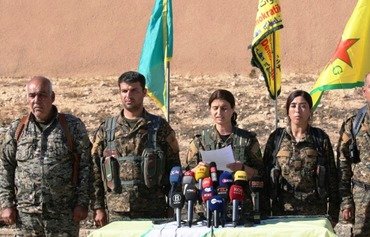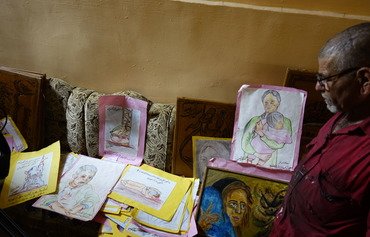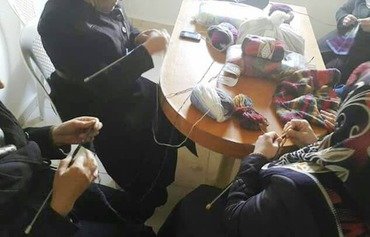Iraqi journalist Hiba Nizar was there when the "Islamic State of Iraq and the Levant" (ISIL) overran Mosul, and remained there undercover for a year before escaping the city in a convoy of women and children.
While she remained in Mosul, she used a false identity card and was able to document many of ISIL's criminal acts against the local population.
When ISIL arrested and interrogated her brother, she escaped across the border to Syria and made her way to Turkey before returning to Iraq's Kurdish region.
Nizar shared her story during a June 2nd seminar, "Mosul and the Islamic State: Where to go from here?" organised by the Carnegie Middle East Centre in Beirut and the American University in Dohuk.
She told Mawtani about her experience living under ISIL and her harrowing cross-border escape to safety.
Mawtani : Where were you when ISIL's attack on Mosul began?
Hiba Nizar : I was at my workplace in Sama Al Mosul Satellite TV when the barbaric terrorist organisation began its attack on the southern section of the city on the afternoon of June 5th, 2014 -- a Thursday -- which lasted until June 8th.
I left my office at dawn that day. I headed home amid a convoy of displaced people after putting on a veil.
Then I saw for the first time fully armed ISIL elements on the streets and alleys of Mosul and the dead bodies of police, soldiers and citizens lying on the road.
Mawtani : How long did you stay in Mosul? And where?
Nizar : I stayed put in Mosul from the day ISIL occupied the city in June 2014 until July 25th, 2015 -- the day I escaped.
During ISIL's attack, I stayed at my home with my husband and three children, and after that I remained in the city secretly, moving around under the name Anoud and using a fake ID.
My mother spread a rumour among my brothers, sisters and relatives that I had gone to Erbil.
Every time she heard about an incident in which a media person or an intellectual was killed, she reproached me for not leaving the city.
Mawtani : What kind of harassment did you experience?
Nizar : ISIL elements harassed me many times.
One time I was in the hospital with my eyes uncovered when an ISIL element suddenly showed up with a cane, coming towards me to strike me.
I quickly covered them.
Another time I had the same experience in a market with my son when one of them, a Saudi, tried to harass me.
Once I was in the market when ISIL elements suddenly appeared in the middle of the street and screamed at a group of women -- I was one of them -- to pray on the street.
I hid while they started beating up one of the women, who was buying milk for her child, who was there with her.
Mawtani : Did you witness ISIL's abusive actions against other people?
Nizar : Yes, many times.
I have seen them on many occasions flogging citizens they had chained to electricity poles after they refused to pray at the times they had decided on.
When they wanted to eliminate a certain citizen, they summoned him to the "sharia court".
They carried out mass killings and threw the bodies on the banks of the Tigris river after removing organs from the corpses to sell in hospitals.
Also, when they entered the city, they called via mosques on state employees to obtain a certificate of repentance in front of an executioner in the "sharia court" and confiscated their mobile phones.
During the time I was there, they issued daily "fatwas" to eliminate and execute citizens.
They once threw citizens from the insurance company building under the pretext that they were gay.
They also seized citizens' livestock, and they hold a database on the entire population of the city.
Mawtani : How was everyday life? Were services being provided?
Nizar : Life essentials are non-existent, epidemics are widespread, and water is contaminated.
My brother's daughter -- a 12-year-old -- died as result of a [treatable] disease due to the unavailability of medicine.
Surgical operation rooms are nearly shut down for lack of medical supplies.
While food and medicine are scarce and workers are not receiving salaries, members of ISIL are living comfortably.
They get addicted to alcohol and drugs and trade in dollars while the people of Mosul die of starvation.
They have taken orphans and recently orphaned children, given them the title of "emir", and trained them in using weapons.
When one of the families affiliated with them loses what they call a "martyr", they send it a barrel of oil as consolation.
Mawtani : You said they trade in dollars. What about the currency they issued?
Nizar : They only promoted it in the media. Citizens trade in Iraqi currency.
Mawtani : What about the time ISIL leader Abu Bakr al-Baghdadi declared the establishment of a "caliphate"?
Nizar : It was in the first week of the month of Ramadan. We were waiting for an important speech and then electricity and communications networks were suddenly interrupted.
When my husband came, he told me that al-Baghdadi had declared an "Islamic state" then he started oppressing, expelling and killing Christians and journalists.
Mawtani : When and how did you escape?
Nizar : After living under threat of my presence being discovered, since I was wanted as a journalist, I decided to escape, but I did not decide when.
It so happened that on July 25th, 2015, I learned that they had arrested my brother because of me and he was being beaten in interrogation, and I decided to leave immediately. They still hold him.
I left with a fake name and ID, in a convoy of women and children.
We drove on rugged roads in a run-down car that broke down on us on the road.
We crossed Mosul and al-Baaj until we reached al-Hasakeh in Syria, and from there on to al-Raqa and then Turkey via smuggling routes.
I changed my accent from Iraqi to Syrian and claimed to be a teacher looking for an eye doctor.
I crossed mountains and my feet bled, with cockroaches and bats keeping me company on my way, until I reached the Turkish border, and from there I traveled to Ankara and later crossed back into Erbil, where I settled down.
During my trip I was stopped for interrogation at ISIL checkpoints but I survived, after seeing dead bodies on the road and citizens being executed on al-Khabour road.

![Iraqi journalist and Mosul native Hiba Nizar was there when the 'Islamic State of Iraq and the Levant' overran her city and stayed on for one year to report undercover. [Nohad Topalian/Mawtani]](/cnmi_di/images/2016/06/22/5667-Iraqi-jourmalist-mosul-600_384.jpg)






